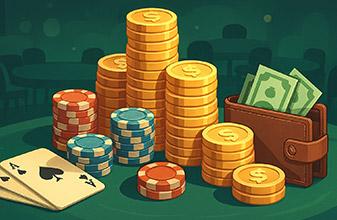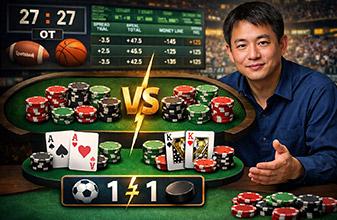Tournament Money Management

Casino games tournaments are fun, and they can be profitable too. In upcoming articles, we will continue to publish a series of excerpts from Stanford Wong’s book, Casino Tournament Strategy.
Many authors advise that money management and skill are equally important in succeeding at gambling. Many gamblers believe that money management alone can make you a winner at gambling. Unfortunately, money management can’t do that. When you do not have an edge, proper money management is to bet zero! Money management says to bet only with an edge. Money management cannot turn negative EV into a positive expectation. Money management and skill at a game are not equally important; skill is much more important.
Money management is not a substitute for skill. Some games have a negative expectation no matter how much playing skill you have. The casino game of craps is an example. Money management cannot help you get an edge at such a game.
The exception to the above paragraphs is tournaments. In tournaments, money management is a skill that gets an edge over the other contestants. But even in a tournament, money management does not give you an edge over the casino. For example, in horse betting, money management cannot overcome the track take.
Some people believe that proper money management can substitute for knowledge to make you a winner at horses. That is baloney. The important thing is to get an edge – to get the expected value in your favor.
Having an edge means if you play the game over and over, you are expected to come out a winner. If for every dollar you invest you get back an average of more than a dollar, you have an edge. This is what you should be trying to do with all the bets you make.
To find your edge, you multiply each possible outcomes by its probability of occurring, and sum over all possible outcomes. An easy example is a bet on red at roulette. For each dollar you bet, you have two dollars after a win or zero after a loss. Out of 38 equally-likely numbers, 18 win and 20 lose. Multiplying outcomes times probabilities gives you the result that for each dollar you bet you end up with 36/38 of a dollar. Thus bets on red at roulette can hardly be considered an investment. For each dollar you invest you must get back more than a dollar to have an edge.
Here is another example. If a horse has a 20% chance of winning, and you can bet that horse at odds higher than 4:1, then you have an edge. Another way of saying the same thing is if all your winning tickets on $2 bets are for $10 or more, and you cash 20% of your tickets, you have an edge. The same logic applies to tickets of other amounts. If all your winning tickets are $4 or more and you win 50% or more of your $2 bets, you have an edge.
Here is the reality
Having an edge means your expectation is to cash more dollars of tickets than the amount you bet.
Thinking you have an edge and actually having an edge are not the same thing. More bettors think they have an edge than do have an edge. Before wagering real money on any system, you ought to make pretend bets to verify that you have an edge.
Money management is something you use to decide the size of your bets after you have achieved an edge. If you don’t have a positive expectation, then money management will not make you a winner. Period.
This article is part of a series, to be continued…
Excerpted with permission from Casino Tournament Strategy by Stanford Wong, edited for this format.











Please log in or register to leave a comment